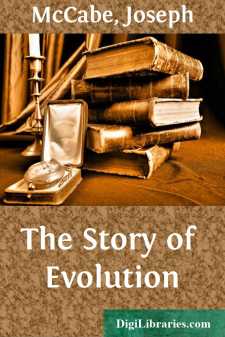Categories
- Antiques & Collectibles 13
- Architecture 36
- Art 48
- Bibles 22
- Biography & Autobiography 813
- Body, Mind & Spirit 142
- Business & Economics 28
- Children's Books 15
- Children's Fiction 12
- Computers 4
- Cooking 94
- Crafts & Hobbies 4
- Drama 346
- Education 46
- Family & Relationships 57
- Fiction 11829
- Games 19
- Gardening 17
- Health & Fitness 34
- History 1377
- House & Home 1
- Humor 147
- Juvenile Fiction 1873
- Juvenile Nonfiction 202
- Language Arts & Disciplines 88
- Law 16
- Literary Collections 686
- Literary Criticism 179
- Mathematics 13
- Medical 41
- Music 40
- Nature 179
- Non-Classifiable 1768
- Performing Arts 7
- Periodicals 1453
- Philosophy 64
- Photography 2
- Poetry 896
- Political Science 203
- Psychology 42
- Reference 154
- Religion 513
- Science 126
- Self-Help 84
- Social Science 81
- Sports & Recreation 34
- Study Aids 3
- Technology & Engineering 59
- Transportation 23
- Travel 463
- True Crime 29
The Story of Evolution
by: Joseph McCabe
Description:
Excerpt
CHAPTER I. THE DISCOVERY OF THE UNIVERSE
The beginning of the victorious career of modern science was very largely due to the making of two stimulating discoveries at the close of the Middle Ages. One was the discovery of the earth: the other the discovery of the universe. Men were confined, like molluscs in their shells, by a belief that they occupied the centre of a comparatively small diskвÐâsome ventured to say a globeвÐâwhich was poised in a mysterious way in the middle of a small system of heavenly bodies. The general feeling was that these heavenly bodies were lamps hung on a not too remote ceiling for the purpose of lighting their ways. Then certain enterprising sailorsвÐâVasco da Gama, Maghalaes, ColumbusвÐâbrought home the news that the known world was only one side of an enormous globe, and that there were vast lands and great peoples thousands of miles across the ocean. The minds of men in Europe had hardly strained their shells sufficiently to embrace this larger earth when the second discovery was reported. The roof of the world, with its useful little system of heavenly bodies, began to crack and disclose a profound and mysterious universe surrounding them on every side. One cannot understand the solidity of the modern doctrine of the formation of the heavens and the earth until one appreciates this revolution.
Before the law of gravitation had been discovered it was almost impossible to regard the universe as other than a small and compact system. We shall see that a few daring minds pierced the veil, and peered out wonderingly into the real universe beyond, but for the great mass of men it was quite impossible. To them the modern idea of a universe consisting of hundreds of millions of bodies, each weighing billions of tons, strewn over billions of miles of space, would have seemed the dream of a child or a savage. Material bodies were "heavy," and would "fall down" if they were not supported. The universe, they said, was a sensible scientific structure; things were supported in their respective places. A great dome, of some unknown but compact material, spanned the earth, and sustained the heavenly bodies. It might rest on the distant mountains, or be borne on the shoulders of an Atlas; or the whole cosmic scheme might be laid on the back of a gigantic elephant, andвÐâif you pressedвÐâthe elephant might stand on the hard shell of a tortoise. But you were not encouraged to press.
The idea of the vault had come from Babylon, the first home of science. No furnaces thickened that clear atmosphere, and the heavy-robed priests at the summit of each of the seven-staged temples were astronomers. Night by night for thousands of years they watched the stars and planets tracing their undeviating paths across the sky. To explain their movements the priest-astronomers invented the solid firmament. Beyond the known land, encircling it, was the sea, and beyond the sea was a range of high mountains, forming another girdle round the earth. On these mountains the dome of the heavens rested, much as the dome of St....



